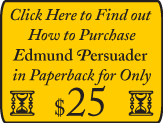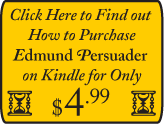An Interview with the Author of Edmund Persuader
We interviewed the author in his study at his house in Maine, a room crowded with multiple computers and lined with well over two thousand books. Though his novel proves him a person with an affection for dogs, a large area of his desk was given over to a bed for a Maine Coon cat. (Unfortunately, the cat was not present during the interview.)
MPD: When did you first get the concept for Edmund Persuader?
SS: I wrote the first outline in the early 1980s, probably 1983 or 1984.
MPD: That long ago? When did you begin writing it?
SS: Not for about twenty years. It wasn’t the writing that daunted me as much as the research. I just didn’t have time for it then.
MPD: But you must have continued to think of it during that interval?
SS: Yes, I kept research notebooks in preparation, even though I almost didn’t believe I would ever have time to write it.
MPD: Did the plot evolve over that time?
SS: Actually, when I finally began writing, I used the original outline. My first step was to transcribe it from the handwritten sheets. I modified it somewhat from there, of course.
MPD: What kind of research did you do?
SS: The usual. A lot of mining of old books.
MPD: Did you travel in Britain?
SS: Yes, though not as much as I wanted to. Never as much as I would want to.
MPD: What was the inspiration for the book?
SS: Well, there was a great unwritten law in European fiction before the twentieth century. It even lived on into Hollywood films until about the 1950s. Actually, it wasn’t unwritten. An author named Robert Bage in the late 1700s, who was disgusted by it, says something to the effect that “No author has yet been so bold as to permit a lady to live and marry or even to be a woman after committing a sexual sin.” If she doesn’t die before the last page, at the very least she is supposed to be depicted in a manner that shows that she has been completely lost to all good society forever. Tess of the D’Urbervilles is a good example.
MPD: What about Lydia in Pride and Prejudice? You mention her in Edmund Persuader. Wouldn’t she be a counterexample?
SS: Yes and no. Jane Austen was definitely taking a slap at the face of convention when she brought Lydia back into the family circle after she had committed her “indiscretion.” But Austen makes it clear that Lydia is at best a silly, thoughtless person, so she doesn’t really fit the bill. I was interested in a truly good heroine who is in danger of being lost.
MPD: So you were interested in creating an anti-convention?
SS: Or at least in writing about a counterexample. Suppose a woman of Austen’s time had committed some terrible sin; and a man learned of it, but actually, out of his own goodness, loved her more for what she had suffered. Edmund Persuader is really about that man; a man of very strong character, a very good man, who errs terribly himself, or at least in his own eyes. But his knowledge of his own failings enables him to see through societal conventions and perceive the great goodness of the woman in question.
MPD: So the question becomes whether she will let herself be loved?
SS: Yes. Sometimes people judge themselves more severely than others do, and that becomes part of their failing. It can be the biggest obstacle to their recovery, to their regeneration.
MPD: Why, as a writer, are you interested in Britain in the Regency era?
SS: It was an amazing period, full of contradictions and craziness. The old mores were in full force, primogeniture and patriarchy and all that, but people were running right up against them. Even while they complained about the way things were, they struggled to live within those norms. To me that’s fascinating. People do the same thing today—live within norms they can’t stand—but the contrasts are much more muted.
MPD: What has the reaction been to your book?
SS: The words “amazing” and “gratifying” come to mind, but they seem too pale. It’s very humbling when you do your best and then more or less throw something out there for the world to take up if it wants to, and instead of encountering polite indifference you are met with deep understanding and obvious enjoyment of what you have produced. People love those characters the way I did.
MPD: Is your audience mostly female?
SS: Yes, but that’s true of fiction in general. Something like 80 percent of all fiction in the United States is purchased by women. So I’m not sure if the percentage of the response I’m seeing reflects anything more than that same proportion. What seems to happen is that women read the book and then talk their partners into reading it. And the response from men has been just as positive.
MPD: What has been the most difficult thing about getting your book to your audience?
SS: I think many women aren’t interested in books written from a male point of view. Of course, I don’t think that should be a problem, but what do I know? Certainly the book has tremendously strong female characters. They act within the norms of their society—you won’t find them becoming Prime Minister or Archbishop of Canterbury. Readers today often expect female characters in other times to do things that are completely unhistorical in order to show they could assert themselves. To me that's just fake. How people actually acted within the historical setting is ultimately more compelling. These women characters are highly educated, highly intelligent, and as strong-willed as anyone could possibly want. So there is nothing missing there for women in the way of positive roles. And I think a good male character would be of interest to them. Often men in novels who possess good characters are mere stick figures. We’re told they’re good, but we know little about them. In general, male characters, like men in real life, are either too passive or too overbearing. Walking that middle way is the hard part, and that is what truly being a man is, in my humble opinion. That was what I tried to portray in Edmund Percy—a man of action who also simultaneously possesses great consideration for others.
MPD: Has calling the book a romance misled potential readers?
SS: Oh, I’m sure it has. But I suppose I was more interested in the historical authenticity of calling it that than I was about the marketing issues. I did explain what I meant by it in the preface, and Mermaid Press actually quotes that explanation on the website. I suppose it was a quixotic attempt to reclaim the term [romance], which used to be a name for novels in general, but particularly for novels of drama or adventure with a strong love element.
MPD: Which Edmund Persuader certainly is.
SS: There, you see—if the shoe fits, put it on.
MPD: Where did you get the names of the characters and the places?
SS: Everyone always asks that. I don’t understand the question, really! Most of the names are fairly common for the time. They are quite authentic, or at least plausible, but I suppose they seem exotic to people today. People then had more affection for names from classical literature, and there are a few of those.
MPD: Whom did you base the character of Edmund Percy on?
SS: I don’t base characters on specific individuals.
MPD: Do you consider yourself like Edmund?
SS: Obviously I share the values that I gave him, but no, I’m no Edmund Percy. I’m more hard-bitten than he is, though I’m an innocent in my own way. And he’s younger than I am, and better looking!
MPD: What about a sequel?
SS: I have no comment on that.
MPD: But the end hints at a sequel.
SS: (Laughing) Sorry, no comment.




